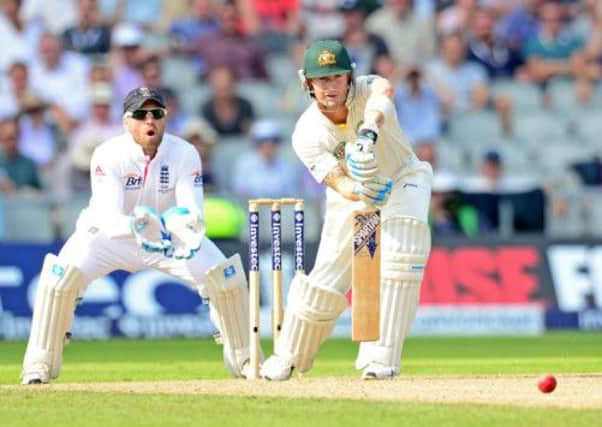Clarke in lead role as he tries to ensure Australia have last laugh


Clarke insisted, both immediately after the tourists lost by 347 runs at Lord’s to go 2-0 down with three to play and then again on Wednesday, that his team can still win the urn back from England this summer.
He acknowledged on both occasions that many may laugh at his continued optimism – but after underpinning Australia’s 303-3 on day one of this third Investec Test, Clarke had reason for a quiet smile to himself.
Advertisement
Hide AdAdvertisement
Hide AdHis chanceless and unbeaten 125 was a prime case of leading from the front in adversity as he, Chris Rogers (84) and Steve Smith (70no) – with whom the captain shared an unbroken stand of 174 – ensured Australia overcame yet more DRS intrigue to establish a dominant position.
There was barely a blip in Clarke’s 169-ball hundred, punctuated by trademark sweet timing and canny placement as well as expert footwork against Graeme Swann – on a pitch already offering the off-spinner conspicuous assistance – and fine judgement of when to leave the seamers.
On a day which witnessed several questionable calls by umpire Tony Hill, one might have cost Clarke when he had made 24 had Ian Bell clung on to a ‘catch’ at leg-slip off Swann.
Runs were given, and Clarke would therefore presumably have had to go – or invoke Australia’s remaining review – even though the ball appeared to hit only his thigh-pad.
Advertisement
Hide AdAdvertisement
Hide AdAustralia were first to fall foul of the decision review system in the morning as the process, which has been vexed throughout the series, served up another clutch of minor controversies.
Usman Khawaja called for a review after Hill’s on-field decision that he had been caught behind off Swann for a single.
There appeared ample evidence, as International Cricket Council protocol dictates there must be, for third umpire Kumar Dharmasena to overturn the verdict. Yet despite the absence of Hotspot or any audio-visual clue that bat had made contact with ball, Khawaja’s dismissal was confirmed. It was a harsh outcome from every angle, but Australia’s No 3 made the first mistake by playing a very poor shot to a length ball which turned sharply.
DRS unsurprisingly had more twists in store, the remainder all favouring Australia – and Smith in particular, as England used up their two reviews on him and then had none left shortly after tea when Stuart Broad would surely have had Hill’s not-out lbw verdict overturned by Hawkeye as the batsman survived on 24.
Advertisement
Hide AdAdvertisement
Hide AdBeforehand, Swann thought he had his man lbw for nought only for computer simulation to vindicate Hill’s ruling by the finest of ‘umpire’s call’ margins; then on 18, Smith also escaped when Dharmasena decided an audible but unidentifiable click on audio replay was not enough to overturn Marais Erasmus’s caught-behind not-out off James Anderson.
Australia had perhaps made some of their luck with much graft already done – not least by Rogers, initially in an opening stand of 76 with Shane Watson after Clarke was able to win his first toss of the series.
Rogers vowed two days ago to dig in and fight for his runs, and so he did – with a string of resounding boundaries for good measure in his partnership with Watson, who edged a good delivery from first-change Tim Bresnan to slip.
By then, Rogers was past his 50 at better than a run a ball, with three fours in one over as Anderson began his second spell from the Statham end.
Advertisement
Hide AdAdvertisement
Hide AdThe left-hander remained on course for a maiden Test century until he became Swann’s second victim, his concentration compromised perhaps by a delay thanks to movement behind the arm before he was lbw aiming to leg.
That success, less than halfway through the day, was to be England’s last as Clarke and Smith took over for the remaining 53 overs.
They quickly assessed that they could not allow Swann to dictate on a surface already so favourable to him – and that good sense, and attendant skill, paid off.
The performance of the Australians came as no surprise to England’s players, in particular Yorkshire’s Bresnan, who said it was only a matter of time before the tourists produced some kind of a fightback.
Advertisement
Hide AdAdvertisement
Hide Ad““We were expecting a fight,” said Bresnan. “I think every time you play against Australia you expect them to fight hard.
“Their backs were against the wall, so why wouldn’t they push even harder back?
“We were expecting something like this. It’s up to us now to counteract that now.
“The conditions were pretty good for batting, so we’re quite pleased with the way we stuck in there. It’s not like we didn’t create any chances. We passed the outside edge frequently.”
Advertisement
Hide AdAdvertisement
Hide AdThe Yorkshireman admitted though that removing Clarke early this morning would be crucial after the Australia captain batted supremely yesterday.
“Hopefully we get him for not many more. Have you got any tips?” he said.
“He’s played pretty well, left the ball well. He’s identified it’s probably a batting day, and got stuck in there.”
Australian opener Rogers – whose 84 was a career-best in Tests – admitted Clarke’s inings had been “massive” for his side as they looked to gain a foothold back in the series.
“He’s such a key person in our batting side,” said Rogers.
“If he scores runs it makes it easier on everyone else around him.”
n Scoreboard: Page 24.